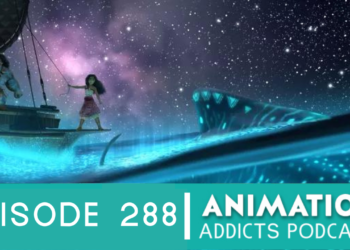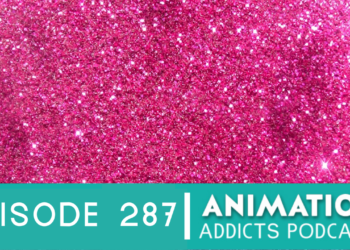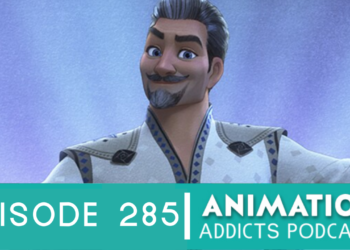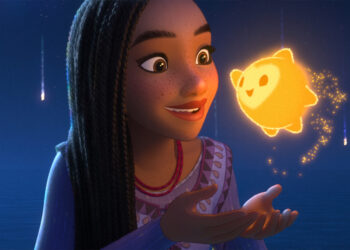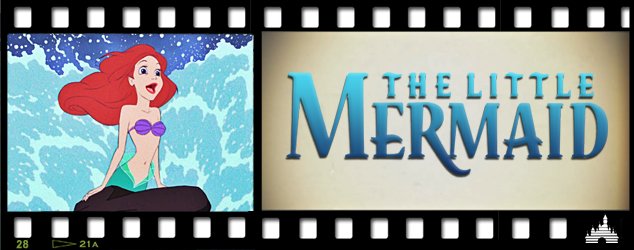
If you mentioned the words “Little Mermaid” around my older brother you would see him roll his eyes as the unwilling victim of my Little Mermaid obsession. You think girls are bad about Frozen now? They have nothing on me and The Little Mermaid. It is the first movie I remember seeing in the theaters, and it captured my imagination and my heart. My sister and I had contests at night to see who sounded the most like Ariel (it was totally me). We knew every song. We knew every scene.
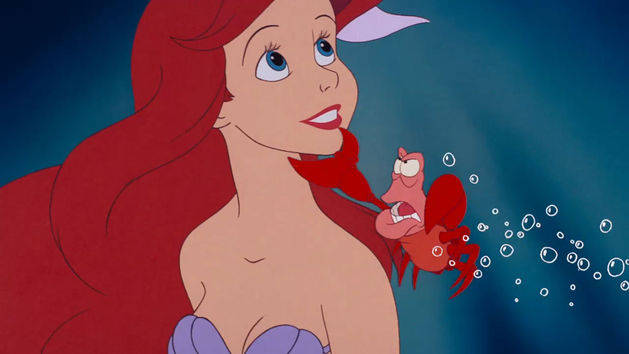
Now, of course, nostalgia should not be the lone reason to enjoy a film, but I’d be lying If I said it wasn’t a contributing factor. For years, The Little Mermaid was my favorite movie and it has always remained in my Top 5 films. As an adult, I’ve heard some criticism, given them lots of thought, and I reject all of them. What most don’t understand is that The Little Mermaid is the story of someone finding where they belong and fighting for their right to stay there.
There’s so much to discuss in the production of The Little Mermaid; it marked the start of the Disney Renaissance and was the first true Disney musical in years. The creators behind the Renaissance got their start here and, with its success, were able to create magic again and again. This includes teams of animators such as Glen Keane and Mark Henn. And It was the second team up for directors Ron Clements and John Musker who created magic again with Aladdin, Herules, Princess and the Frog and Treasure Planet.
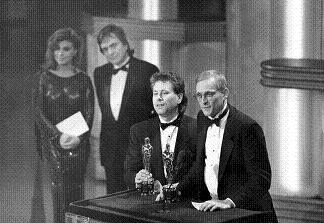
And, of course, we all know about the creative collaboration of Howard Ashman and Alan Menken on the music. What is not as wildly known, however, is how involved Ashman was with the story, too; he was famous for dressing up as the characters to give animators an idea of what he wanted. Ashman is even given story credit on the film, which is unusual for a lyricist. Sadly, Ashman would pass away from AIDS just before the release of Beauty and the Beast, on which was included this final tribute: “To our friend, Howard, who gave a mermaid her voice and a beast his soul, we will be forever grateful.”
And what a voice he gave her: Jodi Benson was selected as the voice of Ariel, the titular little mermaid. When she forgets the big concert where she’s expected to perform, we learn she isn’t just forgetful but has been busy collecting items from shipwrecks. She loves the human world and dreams of it every day, insisting, “I just don’t see how a world which makes such wonderful things could be bad?”
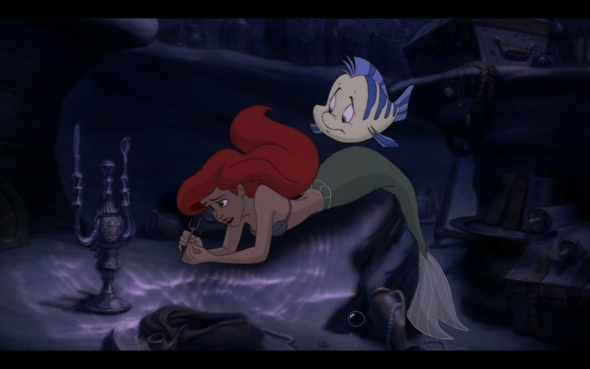
Here is what some people get wrong about The Little Mermaid. I hear the claim that she gives up her freedom, and changes herself, just to get a man, that this is somehow a shallow and anti-feminist desire for her. I see it very differently. She sings “Part of That World” before she meets Eric; you don’t have a grotto full of human artifacts without a deep and abiding yearning for that world. This is no silly crush but a dream of a lifetime. So much so that she would miss an important concert, marking her adulthood, because her mind is on the human world – again before she meets Eric.
When she meets Eric, she is finally given the catalyst to make a change she always knew she needed to make; her father destroying her human artifacts only solidifies this decision. There’s nothing left for her in the marine world and she sees Ursula as her only option. This is why, when Sebastian says to her later that she can go back to the Sea Witch, he follows that with the comment, “and be miserable for the rest of your life.” Again, that’s not something someone says about a little crush.
Speaking of Ursula: how great is she? Pat Carroll is so brilliant with vocals that make her feel like a cross between a drag queen and a truck driver. Ursula can see Ariel’s vulnerability and she exploits that so well. Aside from telling her about giving up her voice, Ursula keeps the real consequences of Ariel’s decision rather vague. After all, “it’s happened once or twice someone couldn’t pay the price.” This is why, later, Ariel tells her father, “Daddy I’m sorry. I didn’t mean to. I didn’t know.” She didn’t know the price to be paid would be so deep.
Sebastian, our Jamaican crab, brilliantly voiced by Samuel Wright, tries to convince her to stay “Under the Sea” to no avail. She doesn’t belong there and so his words fall on deaf ears; but the song is brilliant. Did you know each fish in the “Under the Sea” sequence is a different instrument? This creates an incredible dynamic sound by the end.
The animators also had an incredible attention to detail in The Little Mermaid. Did you know that they animated over a million bubbles? Every time a character moves under the sea, they are surrounded by bubbles and it makes it feel like they truly are in the water.
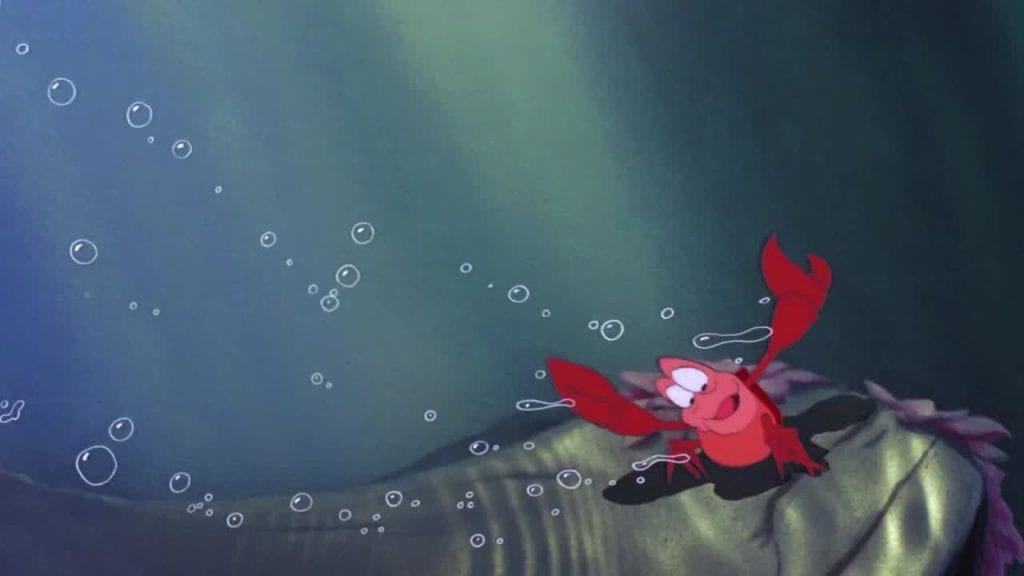
Once Ariel gets her legs, she meets Eric and they have immediate chemistry. Ariel’s character design includes an incredible ability to express emotion through her eyes as she can no longer sing or talk. Watch Ariel in the tour of the kingdom and tell me this is a person who is just there for the man. No way. Her eyes light up at every little thing she sees. She is finally where she belongs.
We also have some humor in these scenes with Chef Louis chasing Sebastian as he sings “Les Poissons”! It’s not really a necessary song but I enjoy it.
And who can forget the wonderful jazz inspired number, “Kiss the Girl.” where Sebastian and the gang get so close to getting Ariel that special kiss?
Finally, we get our climactic end: a face-off between Ursula, now empowered by King Triton’s Trident, and Ariel & Eric. As a young girl, this was pretty intense stuff.
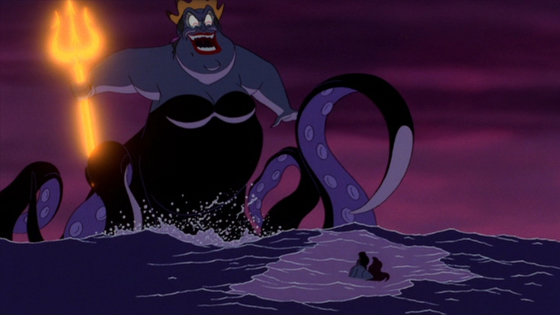
Despite the returning sunshine, Ariel recognizes the consequences of her actions and, watching Eric back on land forlornly, believes that she will never be where she belongs. Her father sees her, realizing just how much this means, perhaps even recognizing how much all this was not about a little crush. He turns to Sebastian and says, “There’s only one problem left: how much I’m going to miss her.”
Some say Ariel has not learned anything by the end of the film. I disagree. She’s learned where she belongs and she’s learned to fight for it. Unfortunately, the final decision is out of her hands, depending on someone else’s magic, but her father sees into his daughter’s heart and gives her legs again.
I think what made this story work for me as a little girl was that I related strongly to Ariel. I wasn’t a child that liked being little; I wasn’t into fantasy worlds or wild imaginations. My idea of imagination was looking at my Mom’s wallet and wondering what it would be like to have my own license and credit card. I hated being treated like I didn’t understand because I was only a child. So, for me, Ariel’s journey of feeling uncomfortable in her own body rang true. We all “want more” at times in our lives, and Ariel’s story should inspire us to go after what is seemingly impossible.
I have heard some say that Ariel is a bad example for young girls. When these people take the film at pure face value, ignoring or unwilling to look for the deeper meaning, then one could see their point. Yet, many a little girl could tell you that Ariel has done nothing but inspire them.
Even if you don’t bond with Ariel’s journey of self-discovery, there should be something for everyone in The Little Mermaid. It’s funny, exciting, scary, romantic, and the music is some of Disney’s best. All together, it makes for an incredibly entertaining and empowering film, a classic that I never tire of watching.
Is The Little Mermaid one of your Disney favorites?
Edited by: Kajsa Rain Forden


